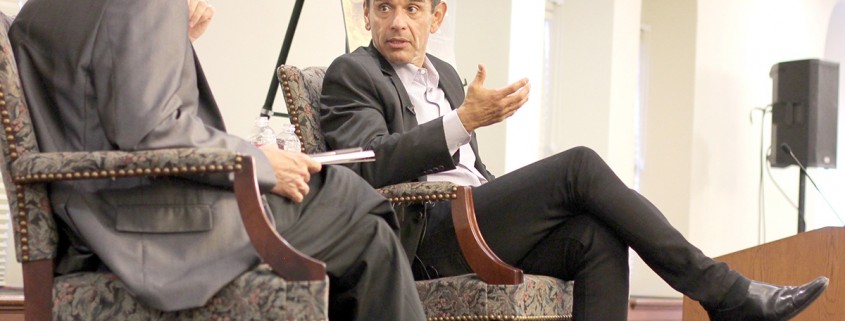Former LA mayor speaks on the state of California
As part of a three-day workshop on the past, present and future of the state of California, the Sidney Harman Academy for Polymathic Study hosted Antonio Villaraigosa, the former mayor of Los Angeles. Wednesday’s event, moderated by Professor Manuel Pastor, was integrated into the workshop’s programming on the theme, “California: Past Imagined, Present Innovation and Future Sustainability.”
The workshop’s opening night focused on the state’s past was hosted on the University Park Campus while Thursday’s events on California’s present will be based at Clockshop in Elysian Park. The event will conclude on Friday at the Huntington Library in San Marino, where participants will examine the state’s future and sustainability.
“The Polymathic Academy is dedicated to interdisciplinary thinking, trying to bring people from all different backgrounds to solve problems holistically, like we’re doing with California in this conference,” said Andrew Schmidt, a senior majoring in philosophy, politics and law. Schmidt now serves as a program assistant for the Academy.
“Villaraigosa is an important figure in California’s recent past as the previous L.A. mayor, but also with the initiatives for California that he has continued with after he was mayor, he’s very forward-looking. He’s a nice bridge for those two facets of the conference,” said Maureen Lenker, a 2011 USC graduate and a member of the Harman Academy’s second graduating class.
In the discussion, Villaraigosa and Pastor explored a number of subjects related to the state, including the notion of the California dream, immigration, income inequality and transportation. Both men argued that in the future, policymakers and scholars would need to “reimagine” the California dream, rather than completely reinvent its identity.
“The dream isn’t as alive in the African American and Latino communities,” Villaraigosa said. “Disproportionately, we see not enough high school graduates … We see a prison pipeline that has disproportionate numbers of African American and Latino males. We see that health outcomes are very different in some groups. A lot of this is based on race and ethnicity, yet at the same time, we’re seeing more African Americans and Latinos going to college than ever before.”
Villaraigosa claimed that the recent decision to raise L.A.’s minimum wage to $15 an hour alone would not be enough to address disparities in opportunity. He also named greater investment in workforce development and strengthening the community college system as a necessary step to bridging the gap.
“Even though mayors don’t have responsibilities for schools, I said ‘forget that.’ If the anchor of a great neighborhood is a great public school, then the anchor of great cities, states and nations is a great public school system. In no small part because I benefited from [Los Angeles public schools],” Villaraigosa said.
The former mayor identified low voter turnout as the state’s largest obstacle for restoring economic prosperity and reimagining the California dream.
The idea for the three-day conference was pitched by Professor Geoffrey Cowan, who serves on the Polymathic Academy’s advisory board. After several months of planning, the workshop was brought to fruition by Tara McPherson, director of the Polymathic Academy, Karin Huebner, academic director of programs, Cowan, Lenker and Schmidt.
Huebner described the planning process behind the workshop and the academy’s effort to remain true to its multidisciplinary roots.
“Being a part of the Polymathic Academy, I wanted to make sure that we approached the topic from multiple registers — art, industry demographics, politics, diversity, infrastructure — so if you look at all the speaker panels, you’ll see how that is reflected in this workshop,” Huebner said. “There’s no way to get a comprehensive look at California in three days, but you can start to tap into it and see that there’s more to explore.”
To apply for participation in the conference, students were asked to pitch a proposal to the next Governor of California, the Los Angeles Times or the New York Times on how the state of California could be a positive force domestically and globally in the future. Huebner named the diversity of the students participating, in terms of area of study and background, as an integral factor for the workshop’s success.
For the fall semester, the Polymathic Academy has six signature “Polymathic Pizza” events based in USC Libraries, which engage students through critical and integrative thinking and communication.
“The library is such an important part of the university because it is the center. Everyone comes to the library to research or to study or to center their academic life. That’s the reason the Polymathic Academy is based here,” Schmidt said.
In November, the Polymathic Academy will host a one-day conference celebrating the centennial of Einstein’s general theory of relativity, an event pitched by Clifford Johnson, a professor in the physics department.

